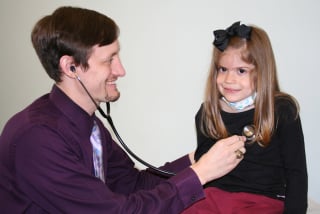The Greenwood Genetic Center Metabolic Advanced Practice Provider (GGC MAPP) Fellowship is a 12-month training program designed to prepare a Nurse Practitioner or Physician Assistant to assist in the diagnosis and medical management of individuals with Lysosomal Storage Disorders (LSDs). Applicants will have a degree from an accredited graduate program and either NP or PA certification.
GGC currently provides clinical diagnostic evaluations across the entire state of South Carolina with 10 physicians, 13 genetic counselors, 3 metabolic dieticians, 2 physician assistants, 1 nurse practitioner, and 1 neuropsychologist. Patients with confirmed LSDs receive disease-specific therapy (when available), care coordination, and specialized laboratory services.
The trainee will be mentored by Dr. R. Curtis Rogers in the Greenville GGC office, where the majority of LSD patients are followed. The MAPP Fellow will participate in clinical visits for patients with known or suspected LSDs seen in all GGC offices (Charleston, Columbia, Florence, Greenville, and Greenwood, SC). In addition, the MAPP Fellow will attend weekly general metabolic clinic and other Greenville-area multidisciplinary clinics.
The academic training will build a broad base of knowledge in clinical genetics coordinated with other clinical and laboratory trainees at GGC. The Fellow will attend the Graduate Course (a 19 week, 66.5 hour course), weekly conferences, monthly case reviews, and monthly seminars. The fellow will present at these events regularly. Dr. Rogers and other faculty will provide periodic didactic sessions pertaining specifically to LSD diagnosis and treatment. A rotation in the GGC Biochemical Genetics Laboratory will allow insight into the diagnostic and monitoring studies used in the care of patients with LSDs.
The MAPP Fellow will be exposed to research in the field of LSDs by attending the WORLD Symposium and working with the local site PI for the Sanofi Genzyme Rare Disease Registries and the Hunter Outcome Survey. An original research project is anticipated, with results presented at an annual meeting such as the Southeastern Regional Genetics Group (SERGG).
By the end of the program, the MAPP Fellow will be capable of working with a team of healthcare providers to improve early diagnosis, recognize at-risk relatives, and order laboratory studies, evaluations, and primary therapies that lead to optimal outcomes for patients with lysosomal disorders in SC. GGC would hope to offer full time employment to the individual who successfully completed this training.


